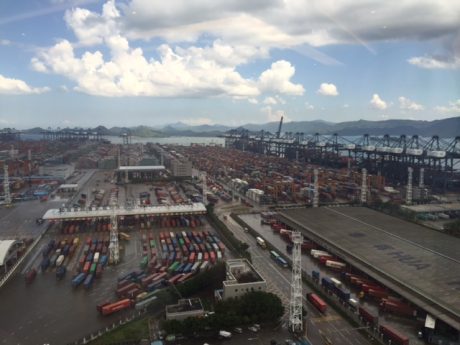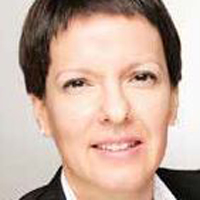Written by Dagmar Schadbach & Yasmin Brook
Our study week in Hong Kong, 18th – 22nd July 2016
The term ‘dim sum’ refers to a vast array of bite-sized dishes typically eaten over a long brunch and served with tea. Whether savoury or sweet, dim sum dishes can be prepared in a number of ways (usually steamed, fried or baked). The most popular types of dim sum range from dumplings, buns, wraps and noodle rolls (often filled with a mixture of fresh seafood, meat and vegetables) to puffs, tarts and puddings.
‘Dim sum’ (點心) literally translates to ‘touch the heart’, whilst the term ‘yum cha’ (飲茶) translates to ‘drink tea’.[1]
Well, our week at Hong Kong Baptist University (HKBU) definitely touched our hearts and was a variety of bite-sized lectures and excursions just like Dim Sum, allowing us to get an excellent taste of what it means to do business in China. From Chinese Wisdom and Modern Management over to the mechanics of M&A in China to the characteristics of the legal system, touching on financial issues and human resources management, we were entranced and fascinated with a business world very different from ours.
Our “dim sum menu” for the first day included an introduction into the Hong Kong Logistics Infrastructure and Operations by lr. Stephen Chan, Managing Director of Power Hub Ltd. We learned about the importance of Hong Kong as one of the major regional and international logistics hubs because of its geographic reach, source of cargo, logistics infrastructure and service providers. Hong Kong very often serves as a stepping stone into the Chinese market. The first day was rounded off by a very informative sightseeing tour of beautiful Hong Kong, which included a visit to the city’s largest temple, an impression of Feng Shui architecture[2] where “windows” are built into high-rise apartment buildings to let dragons from the nearby mountains look through, and an impressive view of the city from Victoria Peak.
The second day agenda included a presentation about M&A in China by Mr. Sunny Wong, Executive Director of the Board, Tibet 5100 Water Resources Holdings Ltd. who described success factors for mergers & acquisitions, taking Carlsberg’s expansion in China as an example. Dr. Leo Ho, Adjunct Associate Professor at Hong Kong Baptist University’s School of Business, gave an overview of doing business in China, about the reforms that led to the rise of the Chinese economy 38 years ago, its economic achievements, success factors and business opportunities. A visit to Commerzbank’s Hong Kong branch and meeting with representatives from Germany gave us students many insights into the opportunities and challenges of the financial system in Hong Kong.
Day 3 started with a seminar on Chinese Wisdom and Modern Management by Dr. Lawrence Pang, Founding President of The Academy of Chinese Wisdom & Management. When doing business in China, it is essential to have a good understanding of the Chinese culture which is based on such concepts as Yin & Yang, holism, Daoism and Confucianism.
Next topic was Hong Kong Legal System from Dr Davy Wu, HKBU. As a Special Administrative Region of the People’s Republic of China, the Hong Kong legal system is significantly different from that of the People’s Republic of China (PRC). The constitutional framework for the legal system is provided by the Hong Kong Basic Law. Under the principle of ‘one country, two systems’, the legal framework of Hong Kong is based on the English common law, supplemented by local legislation
Day 4 was devoted to corporate visits and sightseeing in Shenzhen, a major city in China’s Guangdong province and China’s first Special Economic Zone since the institution of the policy of “reform and opening”. Within 30 years Shenzhen was transformed from a market town of 30.000 inhabitants to a city of a metropolitan population of over 15 million people and is a vibrant example of China’s growth and ability to achieve its set goals.
Courtesy of our colleague Stephanie, we were able to visit “Häfele”, a German manufacturing company for architectural hardware. Häfele manages over 250 suppliers in Shenzen and we were privileged to get an insight on the opportunities and challenges they face.

After a lovely Chinese lunch we continued in Shenzhen to visit Yantian International Container Terminal with an annual throughput of 12166 TEU and the size of the “Englische Garten” in Munich (by the way, one of the biggest inner city parks in the world).
Still gaping with the sheer size and volume of throughput of this container terminal we were whisked to Shenzhen’s Splendid China Folk Culture Village, which is the world’s largest and most comprehensive miniature park, reproducing nearly 100 famous tourist attractions in China and 25 full-scale ethnic villages. We had the opportunity to visit two performances and were duly impressed with the professional artists.
 Far too soon the last day of our elective module in Hong Kong crept up on us and we found ourselves listening to “Financial Issues in the New Developing Markets” by Dr. Alice Chung, Executive Director, Equity Consulting Company Ltd. We had heard about “guanxi” or the importance of networks and relationships before and learned that it is key to the financial sector as well. And although the Chinese passion for gambling is well known, we realised that the same fascination and approach is applied to the stock market and investments.
Far too soon the last day of our elective module in Hong Kong crept up on us and we found ourselves listening to “Financial Issues in the New Developing Markets” by Dr. Alice Chung, Executive Director, Equity Consulting Company Ltd. We had heard about “guanxi” or the importance of networks and relationships before and learned that it is key to the financial sector as well. And although the Chinese passion for gambling is well known, we realised that the same fascination and approach is applied to the stock market and investments.
Dr. Li-Qun Wei, HKBU, gave us an insight into Human Resources Management in China. With now little surprise we learned that the importance of personal relationships or “guanxi” and the concept of “keeping face” is just as important in Human Resource Management as throughout the rest of the Chinese culture. And although the management of people still has very traditional values like “keeping face” and maintaining harmony at all times, the challenges of China’s rapid development are already very visible. The economic transition from a planned and closed economy to an open market economy in an urban environment creates a higher demand for talents. Even though more talents are available the candidates have become less qualified and more mobile. Employees no longer look for long-term employment, but for employers who are willing to pay higher wages than the competition.
Our week finished with presentations on M&A from our colleague Dagmar and her husband Kai, an M&A lawyer, and our colleague Stefan giving us insight into Volkswagen’s presence in China.
Just as you were beginning to think that we did nothing but listening to lectures and immersing ourselves in the art and wisdom of “Doing Business in China”, we have to disappoint you. Our evenings were filled with sampling exotic Korean food, gorging on Dim Sum (even though we did not dare order steamed chicken feet or duck’s tongues), enjoying Honk Kong’s skyline on a river cruise and feeling very glamorous in the Ritz Carlton’s Ozone bar. Would we go again? Yes, definitely!
 About Yasmin
About Yasmin
Yasmine Brook is part of the EMBA Class and currently working as Senior Legal Counselor at CA Deutschland GmbH. Together with Dagmar and some other classmates she went to Hong Kong for their international week.